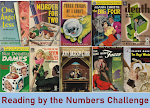The Five: The Untold Lives of the Women Killed by Jack the Ripper (2019) by Hallie Rubenhold
The five--Polly Nichols, Annie Chapman, Catherine Eddowes, Elizabeth Stride, Mary Jane Kelly--women who are known historically for two things (connected). They are the five women recognized as having been the victims of the serial killer known as Jack the Ripper. And "everybody" knows he killed prostitutes. Except...he didn't. Of the five women, there was no evidence that Polly, Annie, or Catherine every engaged in the sex trade in an effort to make ends meet. And only Mary Jane was actively working as a prostitute at the time of her death.
Hallie Rubenhold's meticulous research provides the stories behind the women who are lost in the world's ongoing fascination with the Ripper's unsolved murders. Scores of books, documentaries, and films have investigated and portrayed the killings...always with the same question: Who was the Ripper? Until Rubenhold's book little thought was given to the women who were murdered. Rubenhold uses what sources were available--digging deep into the past to show us women who grew up in lower income families. Some received education, some started with a stable marriage or partnership but relationship difficulties and the lure of alcohol for those struggling to survive in Victoria's England soon led to poverty and Whitechapel. All faced tragedy of one sort or another well before their lives ended--from the deaths of siblings and a father to abusive relationships to undocumented reasons for loss of employment.
Circumstances forced these women to the streets and a need to find a way to purchase a night's lodging. The assumption has always been that all five women resorted to prostitution, but there were other ways to try and come by a few coins. Rubenhold uses the newspaper reports to glean the ragged fabric which she pieces together to make up the tapestry of five lives. Most newspapers exaggerated or embellished or downright lied in order to sell copies--especially when horrible crimes such as these murders were involved. But she sifts the stories, looking for consistent details that can be worked into a telling narrative about women who are just doing the best they can to survive.
Women in the Victorian era were at a disadvantage from the day they were born. Just being female made them less valuable and less likely to be able to stand on their own two feet if there wasn't a dependable man in their lives. Women could not even get the highest paying jobs and those jobs they could get were paid less than what a man would make. In addition women on their own were automatically considered to be failures, at best--if they didn't have a husband and children; if they didn't manage a well-run household then there must be something wrong with them. At worst, they were considered less than human and not worth caring about.
Rubenhold's book is a effort to restore the humanity and dignity to these women who were granted neither in life...or in their well-known deaths. It is a moving and fascinating look at life in the Victorian Age. ★★★★
First lines: There are two versions of the events of 1887. One is very well-known, but the other is not.
Last lines: The victims of Jack the Ripper were never just prostitutes. They were daughters, wives, mothers, sisters, and lovers. They were women. They were human beings, and surely that, in itself, is enough.































No comments:
Post a Comment